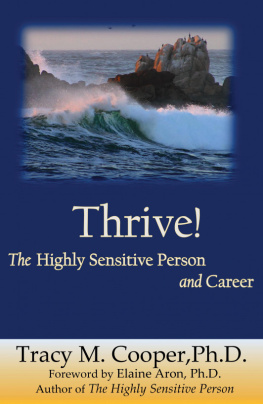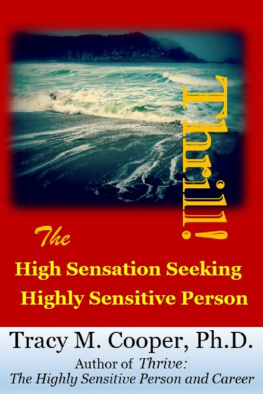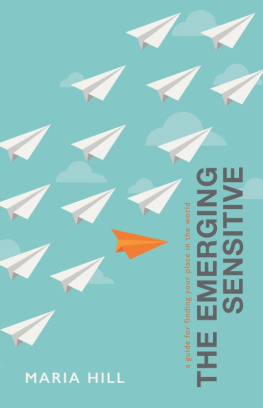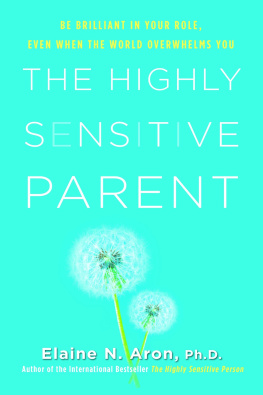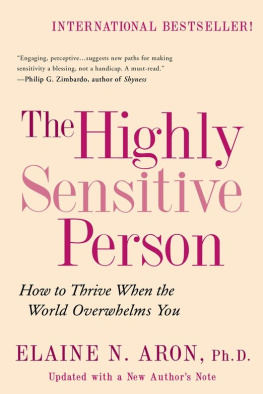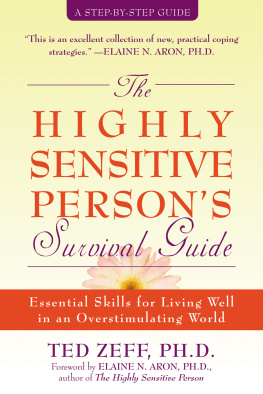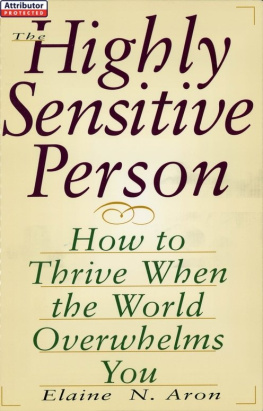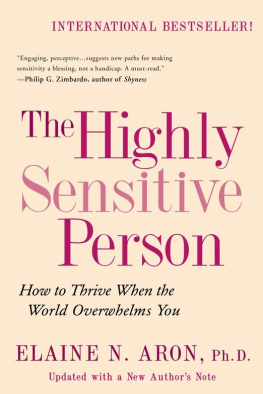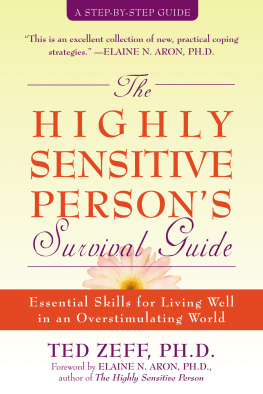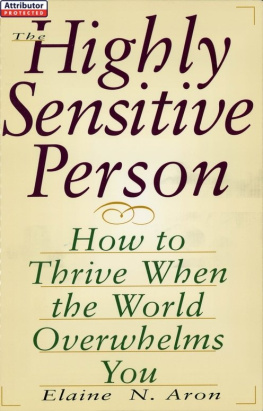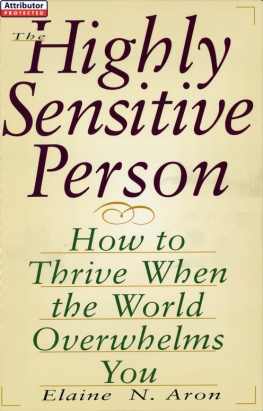Thrive :
The Highly Sensitive Person
and Career
Tracy Cooper,Ph.D.
Invictus Publishing, LLC
Thrive: TheHighly Sensitive Person and Career
All rights reserved.
Copyright 2015 by TracyCooper
Invictus Publishing, LLC
2303 South 16th Street
Ozark, MO 65721
Authors web site:www.drtracycooper.com
This book is protected under thecopyright laws of the United States of America. Any reproduction orother unauthorized use of the authors material herein isprohibited without the express written permission of theauthor.
Published by Invictus Publishing,LLC
First printing: July 2015
Table of Contents
Acknowledgements
I would like to express my sincere thanks toall of the participants in the two research studies that form thebasis for this book. Without their kind willingness to share theirlived experiences this book could not exist.
Appreciation and acknowledgements also go tomy wife, Lisa, for her steadfast belief in me. Great things rarelyhappen in a vacuum and this book is no exception. Numerous peoplehave expressed their support and faith in the need for this bookand in my ability to bring it into being. I acknowledge and thankall for the warm support for myself and for the work ahead.
My thanks to Dr. Elaine Aron for providing astrong foundation of rigorous research that allows researchers likemyself to extend discussions of sensory processing sensitivity tovery practical areas like career.
Dedication
This book is dedicated to everyhighly sensitive person who has ever felt beaten, bruised,battered, ignored, or misunderstood in their quest to build acareer in societies where they are neitherunderstood nor valued. For every sweet soul who has climbed to theproverbial mountaintop, many more lie bloodied and beaten on theslopes. I dedicate this to who are still toiling on the climb andrefuse to give up on themselves and their beautiful talents andabilities. I dedicate this book as a voice for those who have none,who boil inside with passionate, emotional energy, yet who neverfelt safe enough to express their true feelings. This book is theirtestament.
This book is alsodedicated to my beautiful children: Peter, Allyson, Indianna,Benjamin, and stepchildren: Christopher, Micheal, and Caitlin. Maythis book help illuminate your paths.
Foreword
It is with such greatpleasure that I introduce you to Thrive:The Highly Sensitive Person andCareer . Whether you are searching for theright job or career , or already in one, weall work at something and as highly sensitive people, we all needto think about our work in terms of our trait. Above all, we needmeaningful work. That means, ideally, work that suits you, as aunique and highly sensitive person.
A sociologist friend haslikened Western (and increasingly global) attitudes towards findingthe right career to attitudes aboutfinding the right life partnerfall in love with the right one andyou can be happy ever after. Until the last century, the choice ofboth spouse and job was made for largely practical reasons. Parentsdecided, or your location, social class, or economic situationprovided you with few options. Today you choose with many moreoptions, based largely on personal choice andemotions , than a hundred years ago. It isa romantic view, but in line with human progress towards eachperson expressing his or her traits, personality, talents,preferences, and maximally, self-actualization.
People have asked me why Idid not write a book on high sensitivity and work, but I was tooaware that many highly sensitive have married the wrong job andcannot handle the pain or cost of a divorce. You have families orlandlords counting on your income; you feel lucky to have any jobat all; or you are just plain scared of making another mistake. Idid not want to write a book in which I said, Just go for it HSPs must have meaningful work. We cannot always, especially giventhat we also need a workplace that is not too negative socially oroverstimulating.
Tracy Cooper has taken onthe huge task of explaining with great care how you might find theright work situation without so much pain. He has delved into itdeeply, beginning by making this the topic of his doctoraldissertation. He took the qualitative approach, interviewing anumber of highly sensitive people, and then asking a larger numberof them whether they also found true the things he had discoveredfrom his interviews. This is much like the approach I took when Ibegan my research on highly sensitive people. I was always gladthat I had interviewed at least 40 of them for several hours beforeI ever began any quantitative research. I still remember many ofthem.
The breadth of Tracyscoverage of careers is one of the best features of this book. Hehimself has that breadth of experience, from his beginnings in theU.S. Army in an air defense missile combat unit to working inschool yearbook and printing companies to teaching college, earninghis doctoral dissertation, and becoming an author and consultant.Tracy knows what the meaning of frustrated potential truly is. Butthis is not about his past, but the future of the workplace andcareers in general and how you can fit into that.
I particularly like thisbooks discussion of how HSPs might find meaningful work in one ofthe trades, which can be both satisfying and lucrative without somuch formal higher education . This opens adoor that an author with an entirely academic background would haveoverlooked. In effect, he is saying, Have you considered thesecharmers over here as ones to spend your life with. Or if this isalready your partner, you can work on this relationship so thatmaybe you do not need a divorce after all. He also goes deeply intothe values and problems of being self-employed or working at home for your employer. These are realsweeties, but thoroughly know what you are doing before youpropose.
Whatever your job orcareer , Tracy also walks you through theissues of self-care , always a problem forus, but especially at work because of overstimulation and being so open to the effects of theemotions of others. He ends with a numberof stories of other HSPs, in their own words. This is almost likemeeting other HSPs in person as the conversation turns to work. Ittruly helps you to feel you are in good company.
A particularly valuableemphasis in this book is the impact of childhood on how this trait affects your navigation of theworld of work. This reflects the latest research on differentialsusceptibility that sensitive people with a difficult childhoodor stressful history will have greater difficulty (than thosewithout the trait) with their emotional reactions to problems andsimply being out in the world. Those with supportive childhoods, onthe other hand, could be especially successful once they find theirniche. Those without that support will have to work on themselvesfirst to arrive at a similar place, much as Tracy has.
Tracy discusses hischildhood difficulties, which occurredmainly at school, though at home as well. The subject of the impactof the school environment on children is often forgotten byresearchers, but it affects HSPs tremendously, especially boys.Teachers often misunderstand sensitive children as simply being shyand therefore needing to be pushed, which usually makes thingsworse. Or they seem lazy because they lose interest in school,given the slow pace and lack of depth. Or they withdraw because ofthe overstimulation . Sensitive girls maydo better in school by trying to please the teacher, but often havesocial difficulties which can replay in the workplace, along with apossible problem with speaking up with their creative ideas rather than conforming.
One implication is that ifyou are one of those who had a difficult start in life, through nofault of your own, you should not compare yourself to those whoenjoyed an enriched family life or welcoming school environment.Another, happier implication is that sensitive people with moredifficult backgrounds seem to heal from these wounds more quicklythan those without the trait. Therefore, DO NOT despair. It maytake you longer to reach where you want to be, but it is highlylikely that you can do it. Tracy with his painful school experiencefinally found his way in midlife. My childhood problems were more at home, but as with him, it was not untilmidlife that I began researching high sensitivity, earned mydoctorate, and gained my license in clinical psychology. Tracy andI both received some help and I think it fair to say that we areboth doing well, at home as well as at work. Truly, do not give up.You have so much to offer, and let Tracy help you.
Next page
